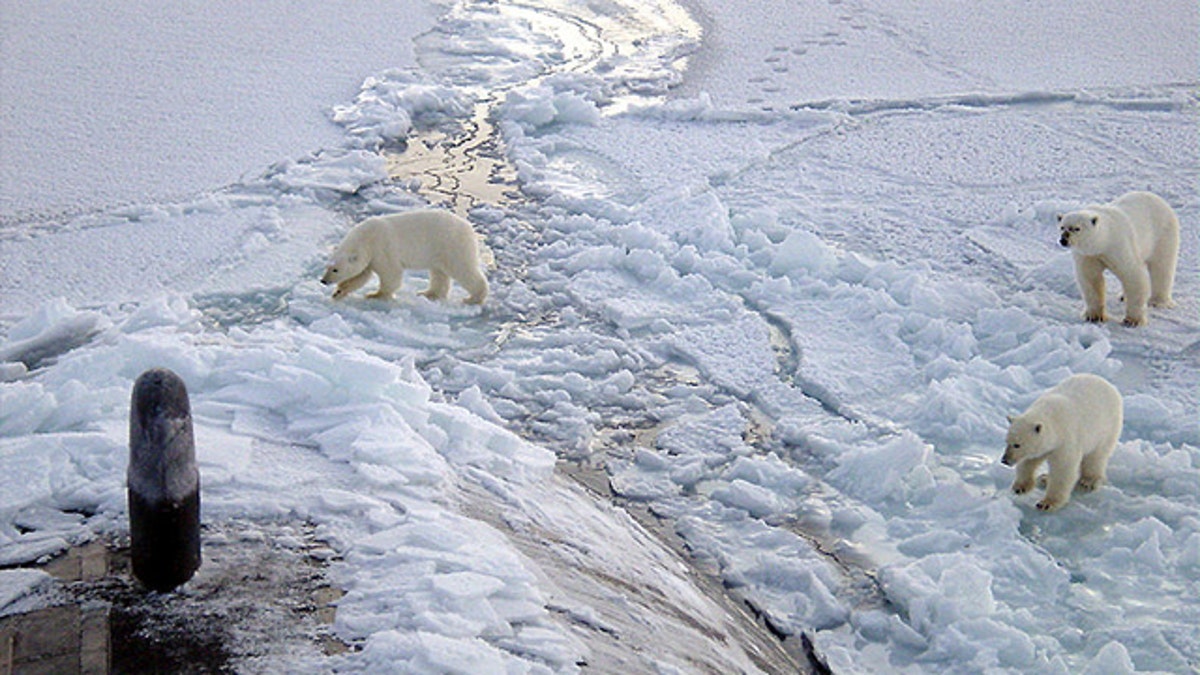
The polar bear has become the poster child for the global warming movement. In May 2008, the U.S. classified the polar bear as a threatened species, the first with its survival at risk due to global warming. (Chief Yeoman Alphonso Braggs, US-Navy)
An Alaska scientist who gained fame in 2011 due to his observations of drowned polar bears, findings that helped galvanize the global warming movement, has retired as part of a settlement with a federal agency.
Charles Monnett was briefly suspended in 2011 from his work with the U.S. Bureau of Ocean Energy Management, Regulation and Enforcement — now known as the Bureau of Ocean Energy Management —during an inspector general's investigation into a polar bear research contract he managed. Investigators in their report released last year said the probe was prompted by a complaint from an Interior Department employee who alleged that Monnett had wrongfully released government records and he and another scientist intentionally omitted or used false data in an article on polar bears.
The agency, BOEM, ultimately found no evidence of scientific misconduct but reprimanded Monnett for improper release of emails that an Interior Department official said were cited by a federal appeals court in decisions to vacate agency approval of an oil and gas company's Arctic exploration plan.
While Monnett returned to work, his prior research portfolio, which was focused on Arctic issues, had been reassigned, said Jeff Ruch, executive director of the watchdog group Public Employees for Environmental Responsibility, which helped Monnett with his case. Monnett filed a complaint, seeking to have the reprimand rescinded, to have his name restored to an award for a bowhead whale tracking project and the ability to transfer jobs, a request that the complaint said had not been granted.
Under the settlement, signed in October but released by Public Employees for Environmental Responsibility on Wednesday, Monnett will receive $100,000 but cannot seek Interior Department work for five years. His retirement was effective Nov. 15, at which point the agency agreed to withdraw the letter of reprimand and issue Monnett a certificate for his work on the tracking project.
The settlement makes clear that it does not constitute any admission of liability, including any admission that federal employees "treated Monnett in a discriminatory or retaliatory manner." BOEM spokeswoman Connie Gillette said by email that she could not comment on personnel matters but said sound science is the foundation of BOEM's decision-making and the agency takes the integrity of its scientists and reliability of their work very seriously.
Monnett, in a release, said the agency tried to silence and discredit him "and send a chilling message to other scientists at a key time when permits for oil and gas exploration in the Arctic were being considered. They failed on the first two goals, but I believe that what they did to me did make others afraid to speak up, even internally."
He said he could not, in good conscience, "work for an agency that promotes dishonesty, punishes those who actually stand up for scientific integrity, and that cannot tolerate scientific work not pre-shaped to serve its agenda."
Ruch said Monnett, 65, is exploring his future options. He said he left his federal job with a fully vested pension.
In 2004, during an aerial survey of bowhead whales, Monnett and another researcher saw four dead polar bears floating in the water after a storm, observations that were later detailed in a peer-reviewed article. They said they were reporting to the best of their knowledge the first observations of the bears floating dead and presumed drowned while apparently swimming long distances.
They said their findings suggested drowning-related deaths of polar bears may increase in the future if the regression of pack ice or periods of longer open water continues. The observations helped make the polar bear a symbol for the climate change movement.
The Associated Press contributed to this report.



















